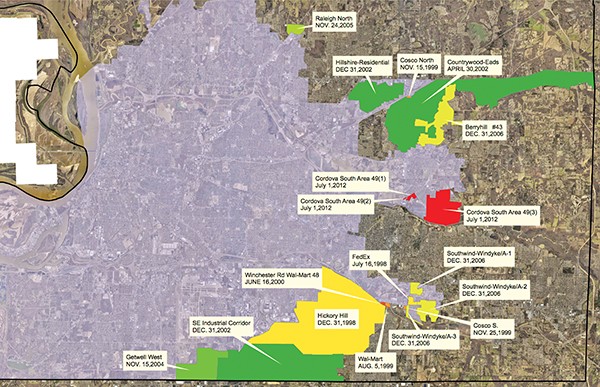Memphis had a lot at stake in Nashville this week as key votes were expected by the Tennessee General Assembly on several bills that would have direct and deep impacts here.
De-annexation
Memphis could lose Hickory Hill, parts of Cordova, and nearly $80 million in tax revenue if legislators approve a bill that would allow some areas to de-annex from cities.
The bill passed the House on Monday, and now it’s headed for the Senate.
Defeating the bill is the biggest legislative priority for Memphis Mayor Jim Strickland, who headed to Nashville this week to talk to lawmakers about it. Strickland said money saved by not servicing those areas would not equal the tax money lost, which is about 12 percent of the city’s budget.
“In the short term, it would be very difficult to avoid a property tax increase to help cover that lost revenue,” Strickland said. “Remember, it’s already a challenge just to balance our budget with current revenue.”
The bill’s sponsors said they want to stop cities from annexing areas to capture tax revenue but then de-annex roads, bridges, or anything else they’d have to pay to maintain. Similar legislation died on the last day of the legislature’s session last year.
Strickland said that while he is open to shrinking the size of the city’s footprint, he’d want to do it more slowly, deliberately, with stakeholders involved, and “not as part of a messy financial crisis.”

Areas Memphis has annexed since 1998
Bike lanes/pedestrian paths
A bill that bicycle and pedestrian advocates call “dangerous” was slated for key votes on Tuesday, possibly clearing major hurdles on its way to becoming law.
The bill would prohibit cities and counties from spending state gas tax funds on bike lanes, pedestrian walkways, and “other non-vehicular facilities.” The bill is sponsored by Rep. Mike Carter and Sen. Todd Gardenhire, both from the Chattanooga area.
The Senate bill headed to the powerful Senate Finance, Ways, and Means Committee this week, but it arrived there with a negative review from a sub-committee that oversees state revenues.
The chairman of that sub-committee, Sen. Doug Overbey (R-Maryville) said concerns about the bill from constituents have “filled up my inbox.” Gardenhire laughed and told him “that’s what they make that delete button for.”
Portions of the state gas tax are required to go to cities and counties. Those governments sometimes use the funds to build bike lanes or for matching dollars to get federal money for bike and pedestrian projects.
Gardenhire said legislators would likely be asked to consider a gas tax hike next year, and his constituents want the money spent on bridges and roads, “not for recreational use,” noting that cities that want bike lanes “need to pay for it themselves.”
Skunks as pets
Having a skunk as a pet remains a Class C misdemeanor in the state after House members voted down a measure that would have made it legal.
Lawmakers were concerned that loosening the law could lead to the spread of rabies. State Senators didn’t think so, though. They passed the bill in February on a vote of 27-3.